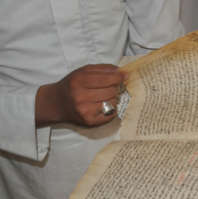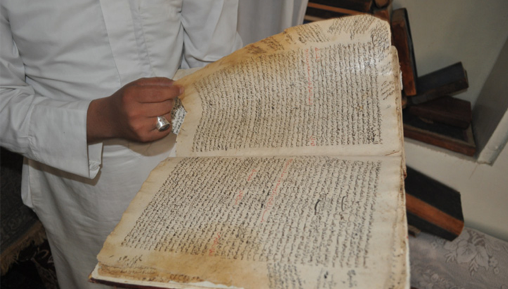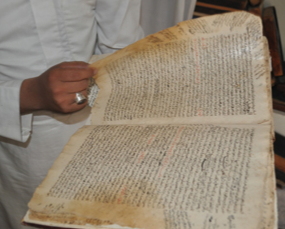
While manuscript digitization may sound like a dry administrative project, it is actually, like so many library-related movements, politically charged. Especially when the manuscripts in question are in Yemen.
Last December, Ahmed Ishaq, executive director of a small nonprofit organization in Yemen, and two of his volunteer digitization technicians, disembarked from their plane at the Berlin international airport. The three men, who had never traveled outside Yemen, much less to a Western country, were on a mission: learn to use the most advanced digitization equipment available and return to Yemen to digitize the manuscripts of three private libraries.
For David Hollenberg, a UO professor of Arabic and religious studies, the Berlin visit marked the beginning of what he hopes will be a comprehensive effort to preserve one of the world’s largest and most important collections of Arabic manuscripts. Hollenberg is the founder and director of the Yemeni Manuscript Digitization Initiative (YMDI), the program that made this trip possible.
While manuscript digitization may sound like a dry administrative project, it is actually, like so many library-related movements, politically charged.
Hollenberg estimates more than 10,000 manuscripts, mostly from the Zaydi-Shii tradition in northern Yemen, have disappeared over the last 10 years. While Yemen’s challenging economic, political and social crises have contributed to the sale of private collections, many manuscripts have been destroyed by Salafi extremists opposed to Zaydi-Shiism and its intellectual heritage.
“This is about preserving an entire cultural and intellectual history that is in peril,” said Hollenberg, who estimates that Yemen’s current instability poses an unprecedented threat to Yemeni manuscripts. “If YMDI is not successful, an intellectual and literary heritage more than a thousand years old could be destroyed in a single generation.”

More than 10,000 Yemeni manuscripts have disappeared over the last 10 years, many of them destroyed by extremists opposed to Zaydi-Shiism and its intellectual heritage.
Unlike mass-produced printed books, Arabic manuscripts are handwritten. In libraries throughout the Middle East and Europe, thousands of classical Arabic works of science, literature, law, theology and grammar exist only in manuscript form.
Yemen’s collection of such books is especially rich. The country contains at least 6,000 private libraries possessing some 50,000 manuscripts, including some of the earliest Qur’an fragments and theological treatises ever discovered. Many of these sources do not exist outside of Yemen. When manuscripts are destroyed, the intellectual and literary loss can never be recovered.
Hollenberg had long been aware of the risk to the books but hadn’t encountered a solution until 2007 when, on a trip to Yemen as a visiting scholar, he encountered Ahmed Ishaq’s nonprofit organization, the Imam Zayd ibn ‘Ali Cultural Foundation (IZBACF).
He was impressed to find IZBACF a highly efficient group that had already digitized more than 6,000 original manuscripts, while outfitted with only a few pieces of used digitization equipment and an almost entirely volunteer staff. “They work with the zeal of individuals desperately attempting to preserve their heritage in the face of its erasure,” said Hollenberg.
Despite the political tensions that can complicate collaborations between American and Islamic organizations in the Middle East, Hollenberg found the staff open and willing to accept his interest in furthering their efforts. “The trust they have shown us is remarkable, given their embattled position in the world and within their own society,” he said.
Hollenberg sought and received funding from the National Endowment for the Humanities to team with IZBACF as well as Princeton University Library and Freie University, Berlin, both of which provided equipment and resources for the digitization effort. Thus began the Yemeni Manuscript Digitization Initiative, an international collective of scholars and librarians hosted by the University of Oregon (ymdi.uoregon.edu).
In January, Ahmed Ishaq and his colleagues, AbdulRahman Alneamy and Abdullah alWajih, returned to Yemen with archive quality digitization equipment on loan from Freie University. In short order, they successfully digitized several manuscripts and mailed the first installment to Princeton Library for inclusion in its digital archives (diglib. princeton.edu), which are available to the public. Hollenberg hopes the digitization of thousands more manuscripts—and the establishment of Yemen’s own digital manuscript library—will follow.
—Patricia Hickson
Photo by David Hollenberg




 Watch
Watch  Watch excerpts from the opera, coming soon to Eugene.
Watch excerpts from the opera, coming soon to Eugene. 

 Three’s a charm for a living memorial.
Three’s a charm for a living memorial.